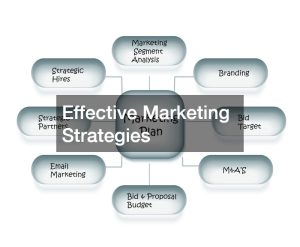How to Master Business Management Fundamentals for Small Business Success
Introduction
Mastering business management fundamentals is crucial for achieving small business success. Understanding these basics provides a solid foundation upon which entrepreneurs can build and grow their businesses effectively. In the United States, statistics show that about 20% of small businesses fail within their first year, and by the end of the fifth year, roughly 50% have ceased operations. This article delves into the vital management principles that can help change those odds. We will explore essential components like strategic planning, financial management, marketing, human resource essentials, leadership, customer relationship management, performance monitoring, and innovation.
1. Understanding Business Management Fundamentals
Business management fundamentals refer to the essential principles and practices that govern effective business operations and decision-making. These fundamentals are crucial for small business success, as they provide frameworks and tools that help entrepreneurs plan, organize, execute, and evaluate their business operations strategically. The key components of business management, often referred to by the acronym POLC, include Planning, Organizing, Leading, and Controlling. Mastering these components allows business owners to align their objectives with actual business performance, ensuring sustainable growth and profitability. By integrating these management fundamentals into daily operations, entrepreneurs can navigate challenges more efficiently and capitalize on opportunities as they arise.
2. Strategic Planning for Small Businesses

Strategic planning is the backbone of any successful business endeavor. By engaging in strategic planning, small businesses can set clear objectives, prioritize actions, and allocate resources efficiently. Developing a comprehensive business plan is an integral part of this process, as it serves as a roadmap for the business’s future trajectory. A well-crafted business plan typically includes an executive summary, company description, market analysis, organizational structure, mission and vision statements, product or service line, marketing, and sales strategy, as well as financial projections. Entrepreneurs can utilize resources like the SCORE Business Plan Template to ensure they cover all essential elements effectively.
Setting SMART goals is a vital strategy in the overall planning process. SMART goals are Specific, Measurable, Achievable, Relevant, and Time-bound, providing clear criteria for success and allowing businesses to track their progress over time. These goals help entrepreneurs focus their efforts, improve their time management, and increase motivation to achieve desired outcomes. When setting goals, it’s important to align them with larger business objectives and continuously review and adjust them as necessary. By setting and monitoring SMART goals, businesses can maintain direction and make informed decisions that drive success.
3. Financial Management Basics
Financial literacy is a non-negotiable part of business management fundamentals. Understanding key financial statements, including the Income Statement, which shows profitability during a specific period, the Balance Sheet, summarizing assets, liabilities, and owners’ equity at a given point, and the Cash Flow Statement, reflecting the cash inflow and outflow, empowers business owners in their decision-making processes. By thoroughly analyzing these documents, entrepreneurs can gain insights into their company’s financial health and identify areas for improvement and growth. Resources like the Investopedia Financial Statements Overview are excellent tools for business owners looking to deepen their financial knowledge.
Budgeting and financial forecasting are critical processes that support sustained business success. A budget is an essential financial management tool that outlines a business’s expected income, expenses, and cash flow over a particular period, thus aiding in financial planning and control. Effective budgeting and forecasting help business owners plan for seasonal fluctuations, unexpected expenses, and special projects, ensuring long-term stability. Regularly monitoring budgets and making necessary adjustments can protect the business from financial pitfalls. Entrepreneurs should establish financial forecasting by identifying different revenue streams and applying various scenarios to adapt to changing market conditions effectively.
4. Effective Marketing Strategies

Recognizing and understanding your target market is imperative in crafting effective marketing strategies. Conducting thorough market research offers valuable insights into consumer preferences, competitive dynamics, and industry trends, which in turn inform targeted marketing campaigns. Various tools can facilitate this research process, including surveys, focus groups, and digital analytics platforms. Understanding your audience’s needs and preferences allows you to tailor your products and services, ensuring customer satisfaction and engagement. Implementing these insights into your overall marketing strategy reinforces brand loyalty and business growth while giving your business a competitive edge.
Developing a marketing plan is a strategic approach that guides your marketing efforts toward achieving specific business objectives. An effective marketing plan outlines the business’s target audiences, marketing objectives, promotional strategies, budget, and schedule for execution. Using both online and offline marketing strategies ensures broad outreach and engagement. Entrepreneurs can download and utilize the HubSpot Marketing Plan Template as a comprehensive guide to formulating their marketing plans. Consistent reviews and updates of the marketing plan enhance its relevance and effectiveness.
Digital marketing has become an indispensable part of business management fundamentals in today’s technology-driven world. Understanding digital marketing basics like SEO, content marketing, and social media utilization helps businesses build a strong online presence. These tools can amplify brand visibility, foster customer engagement, and drive sales. Entrepreneurs should strategically leverage consistent, relevant, and engaging content to connect with their audience on preferred digital platforms. Implementing data-driven approaches and continuous performance analysis allows for refinement and innovation, ensuring a sustained competitive advantage in digital marketing.
5. Human Resource Management Essentials
Building a strong team is integral to the success of any small business. Hiring the right talent is crucial for driving innovation, productivity, and ultimately, business success. Effective recruitment processes involve defining key roles, crafting comprehensive job descriptions, and utilizing diverse hiring channels to reach a broad spectrum of potential candidates. Strong onboarding programs facilitate a seamless transition for new hires, integrating them into the company culture and enabling them to contribute positively from the start. Businesses investing in developing robust human resource management practices often experience enhanced employee satisfaction, retention, and performance.
Employee training and development are pivotal components of maintaining a skilled and competitive workforce. Continuous learning opportunities not only enhance individual capabilities but also foster organizational adaptability and innovation. Entrepreneurs should align training programs with business goals, ensuring they meet current and future skill demands. While technical skills are critical, fostering soft skills like communication, problem-solving, and leadership is equally important. Business owners can refer to resources like the SHRM Employee Training Guide to design and implement effective training strategies tailored to their business needs.
6. Leadership and Team Management
Developing leadership skills is a cornerstone of effective business management fundamentals. Strong leadership drives organizational success by inspiring employees, fostering a positive culture, and steering the company through challenges. Key leadership traits include effective communication, emotional intelligence, strategic vision, adaptability, and the ability to inspire and motivate others. Entrepreneurs can grow their leadership capabilities through continuous learning, mentorship, and practical applications in managing diverse teams. Numerous resources are available to help entrepreneurs hone their leadership skills, including workshops, seminars, and online courses focusing on business management practices and leadership.
Effective team communication serves as a catalyst for fostering collaboration and innovation within a business. Clear, open, and timely communication ensures that every team member is informed, aligned with company goals, and able to fulfill their roles efficiently. Utilizing modern communication tools enhances team connectivity and productivity, allowing for seamless collaboration regardless of geographical locations. Businesses can leverage platforms like Slack for Team Communication to streamline information flow and improve team interactions. Establishing a culture of open communication, feedback, and transparency strengthens the overall business framework.
One phrase that supports the development of leadership skills emphasizes that effective leaders understand the importance of being not only a boss but also a mentor who guides and supports their team members. This approach cultivates an environment where individuals feel empowered to contribute their ideas and take ownership of their responsibilities. Establishing clear expectations, recognizing accomplishments, and providing constructive feedback can transform a workforce into a cohesive, high-performing team that drives the organization toward its goals. The art of leadership lies in balancing authority with empathy, making every team member feel valued and heard.
7. Customer Relationship Management (CRM)
Providing exceptional customer service is not just an add-on but a fundamental business management practice that significantly impacts overall success. By focusing on customer satisfaction, businesses can build a loyal customer base, which is vital for repeat business and positive referrals. Exceptional service goes beyond merely meeting customer expectations; it involves exceeding them consistently. By actively listening to customer feedback and continuously improving service delivery, businesses can strengthen their reputation, boost customer retention, and ultimately drive growth. Entrepreneurs can actively implement customer relationship strategies that prioritize service excellence, fostering long-term success.
CRM tools play a pivotal role in managing and optimizing customer interactions effectively. These software solutions gather and analyze customer data, providing valuable insights into purchasing behavior and preferences. Utilizing CRM tools allows small businesses to deliver personalized experiences and anticipate customer needs, enhancing overall customer satisfaction. Popular CRM solutions, like Salesforce and HubSpot, offer features that streamline marketing, sales, and service processes, while resources like Capterra CRM Software Reviews provide guidance in selecting the most suitable CRM for a business. Investing in a robust CRM system can significantly impact a company’s bottom line.
8. Monitoring Performance and Making Adjustments
Tracking Key Performance Indicators (KPIs) is vital for understanding and gauging business success over time. KPIs provide quantifiable measurements that align with business objectives, such as revenue growth, customer acquisition cost, and conversion rates. Monitoring these indicators enables businesses to identify performance trends, assess goal achievement progress, and spotlight areas needing improvement. By continually reviewing and analyzing KPIs, companies can make informed decisions, optimizing strategies for growth and improved operational efficiency. Empowering teams with accessible performance data encourages accountability and cultivates a results-oriented culture focused on continuous improvement.
Regular performance reviews serve as valuable checkpoints for assessing business progress against established objectives. These reviews involve evaluating both team and individual performances, highlighting accomplishments, and addressing challenges. Setting a consistent review schedule ensures timely feedback, fostering development and motivation among team members. Performance reviews also facilitate open dialogue between management and staff, encouraging communication, transparency, and alignment with organizational goals. Utilizing performance data effectively assists businesses in fine-tuning their strategies, making adjustments, and reallocating resources to prioritize areas of growth and opportunity.
Like the effective use of financial statements in business operations, measuring performance indicators is another essential practice in business management fundamentals. Performance analysis helps businesses stay agile and responsive in dynamic market conditions. By fostering a culture that values continuous assessment and adaptation, companies can remain well-positioned to seize opportunities and mitigate risks. Entrepreneurs should harness these insights to drive strategic decision-making and guide their business toward achieving long-term success. Investing time and resources in performance monitoring not only benefits the organization but also empowers individuals to drive their professional growth.
9. Embracing Innovation and Continuous Improvement
Fostering a culture of innovation is paramount for small business growth in a rapidly evolving marketplace. Encouraging creativity and new ideas among team members can lead to breakthrough products, services, and processes that deliver significant value to customers. Cultivating an environment where experimentation is welcomed and failure is seen as a learning opportunity promotes innovative thinking and adaptability. Business owners should actively seek input from employees, customers, and industry peers to identify growth opportunities and nurture a mindset of continuous improvement. By emphasizing innovation as a core value, businesses can stay ahead of industry trends and maintain a competitive edge.
Adapting to change is inherent in the life cycle of a successful business. Market conditions, consumer preferences, and technological advancements constantly evolve, requiring businesses to remain agile and ready to pivot when necessary. Staying informed of industry shifts and embracing change can lead to significant growth opportunities. Leveraging resources like the Harvard Business Review on Agility provides valuable insights and strategies for thriving in dynamic landscapes. By instilling a proactive and adaptable approach to change, entrepreneurs can ensure their businesses remain resilient and competitive in an ever-changing economy.
Continuous improvement is a fundamental aspect of thriving in the modern business world. Encouraging a mindset of continuous learning and growth equips businesses with the ability to adapt and overcome obstacles. Entrepreneurs should focus on refining processes, investing in employee development, and seeking innovative ways to enhance customer experiences. By incorporating feedback and insights from various stakeholders, companies can set the stage for amplifying efficiency, boosting productivity, and maximizing stakeholder engagement. These practices rooted in business management fundamentals underscore the importance of progress and sustainable business success.
Conclusion
In conclusion, mastering business management fundamentals is vital for achieving lasting success in the competitive world of small businesses. By focusing on strategic planning, financial management, marketing strategies, human resource essentials, leadership, customer relationship management, performance monitoring, and innovation, entrepreneurs can lay a strong foundation for growth and sustainability. Business owners are encouraged to take actionable steps towards enhancing their management skills and adopt a proactive approach to learning. Continuous improvement and adaptability are essential in navigating the ever-changing business landscape, ensuring resilience and long-term success.
